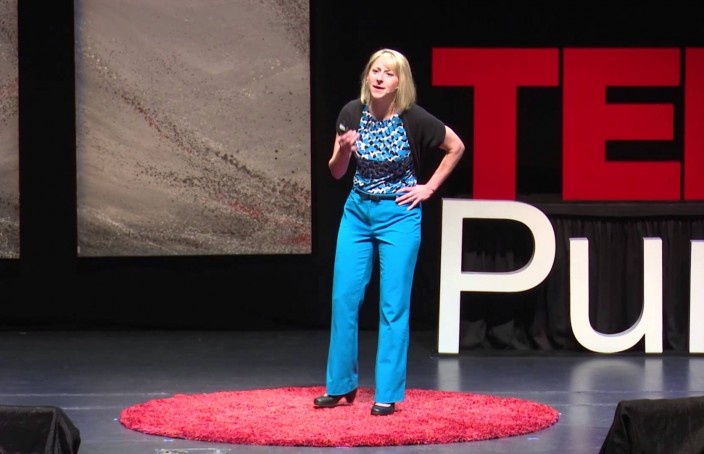Ignoring medical guidelines and adopting a low-carb, high-fat diet is the way to reverse type 2 diabetes, according to Dr. Sarah Hallberg.
Hallberg is the Medical Director of the Medically Supervised Weight Loss Program at IU Health Arnett, United States. Earlier this month, she gave a presentation at a TEDx event in Purdue University, Indiana and provided evidence that type 2 diabetes can reversed.
The results from Hallberg’s clinic raises interesting questions regarding diabetes guidelines in the UK and abroad as to what the right approach should be regarding carbohydrate consumption for people with type 2 diabetes.
Reversing type 2 diabetes
Type 2 diabetes is either caused by insulin resistance or being unable to produce enough insulin. As Hallberg points out, “Diabetes is a state of carbohydrate toxicity. Insulin resistance is a state of carbohydrate intolerance.
“Carbohydrate intake is the single biggest factor in blood sugar levels and therefore the need for medication,” Hallberg adds, before addressing the general recommendations regarding carbohydrate intake for type 2s.
It should be noted that Hallberg is only referring to the American Diabetes Association (ADA), but we’ll come to the NHS and Diabetes UK a little later.
“The general recommendations are to tell patients with type 2 to consume 40-65g of carbohydrate per meal, plus more at snacks. We are essentially recommending that they eat exactly what’s causing their problem,” says Hallberg.
Hallberg highlights a pattern of what this means for type 2 patients who are treated with insulin: After eating carbs, glucose levels increase as does the need for insulin, which, as insulin is our fat storage hormone, hunger fat is then stored, making it harder to lose weight.
She adds: “The ADA guidelines specifically state that there is inconclusive evidence to recommend a specific carbohydrate limit. Nowhere in the ADA guidelines is the aim of reversing type 2 diabetes. This needs to be changed because type 2 can be reversed, in many if not most situations, especially if we start early.”
A low-carb, high-fat diet
Hallberg explains that while the body requires essential amino acids (proteins) and essential fatty acids, the body has no minimum daily requirement for carbohydrates. A low-carb, high-fat diet has been found by Hallberg to yield positive results for type 2 patients on insulin.
“When our patients decrease their carbs, their glucose goes down and they don’t need as much insulin. Their insulin levels drop fast. Low-carb intervention works so fast that we can literally pull people off hundreds of units of insulin in days to weeks,” Hallberg says.
When discussing the impact of fat in this diet, Hallberg explains: “Low-carb is not zero carb and it is not high protein. My patients eat fat, and a lot of it. Fat is the only macronutrient that is going to keep our blood glucose and insulin levels low.”
Hallberg then details a study her clinic conducted in which 50 type 2 patients treated with the low-carb, high-fat program were compared to 50 patients treated with ADA guidelines.
After six months, a significant metabolic advantage was found for the low-carb group (further details were not disclosed), who were able to decrease their insulin by almost 500 units a day, on average. In contrast, the ADA treated group had to increase their insulin by an average of 350 units a day.
Carb guidelines in the UK
Given Hallberg’s findings, why do guidelines for carbohydrate consumption in diabetics differ so greatly?
The NHS state: “There’s no cure for (type 2) diabetes, so treatment aims to keep your blood glucose levels as normal as possible and to control your symptoms, to prevent health problems developing later in life.”
For treating type 2 diabetes, at least in regard to diet, they recommend: “Increase your consumption of high fibre foods, such as wholegrain bread and cereals, beans and lentils, and fruit and vegetables. Avoid high fat foods, such as mayonnaise, chips, crisps, pasties, poppadums and samosas.”
So, essentially, the NHS advocates eating relatively high-carb and low-fat foods.
Diabetes UK acknowledges the low-carb diet, but report that “despite the short-term benefit there is a lack of evidence related to the long-term safety and benefit of following this diet. Although there is substantial evidence regarding low-carbohydrate diets, the strength of the studies vary.”
Subsequently, they recommend: “A range of approaches to weight loss should be considered with the overall aim of energy intake being less than energy expenditure; and that the most appropriate method to achieve this is identified between the person with diabetes and their dietitian.”
These guidelines have led to low-carb diets being minimally referenced in the mainstream, but there is plenty of evidence that they work, and a low-carb diet may even have HbA1c benefits for people with type 1 diabetes. Low-carb diets have also been found to be successful in aiding weight loss among non-insulin treated type 2 patients.
Can type 2 diabetes be cured?
Medical guidelines may say no, but Hallberg retorts that if patients follow the low-carb, high-fat diet, they can at least be free of diabetes. “Cured would imply that it can’t come back, and if they start eating excessive carbs again it will, but they don’t have diabetes any longer,” she says.
Reversing the progression of type 2 diabetes has successfully been proven, but this is not possible in all cases, and while some patients may be able to come off medication, blood sugar levels should still be regularly checked afterwards as reversal does not qualify as a cure.
Dr. David Cavan, author of the book Reverse Your Diabetes, outlines how a restricted-carb diet, similar to the Mediterranean diet, can control type 2 diabetes. Additionally, the low-carb diet is also gaining acclaim following Dr. David Unwin’s “hugely promising” study following the success stories of DCUK forum members who adopted a low-carb diet.
Where do you stand on the reversal of type 2 diabetes? Have you found that a low-carb, high-fat diet worked for you? Share your thoughts in the comments section below.
Picture: www.youtube.com




